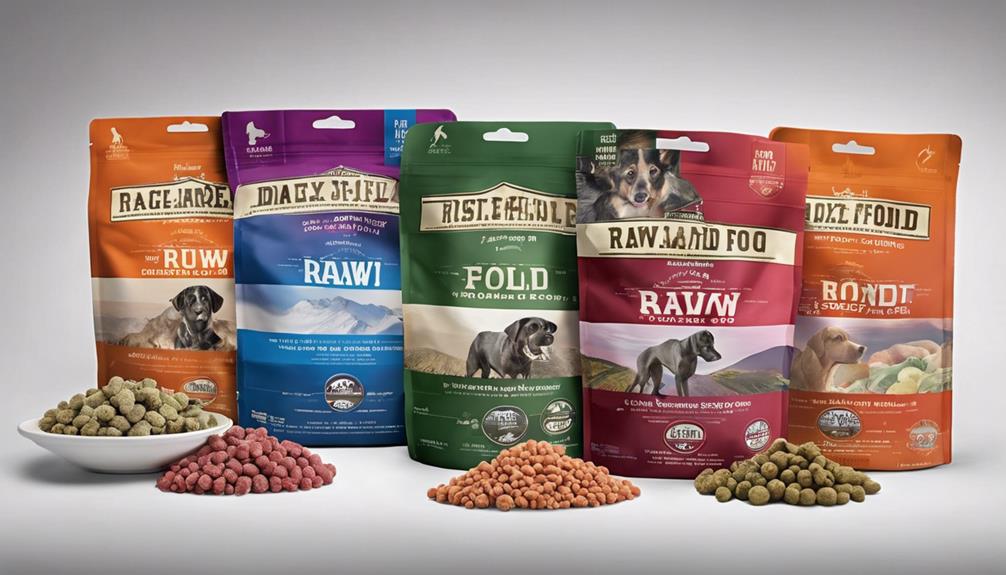Dogs should not have walnuts. Walnuts can be harmful because of mold and high fat. Mold in walnuts, especially black ones, can contain toxins. These toxins may lead to digestion problems in dogs. Symptoms of walnut poisoning include vomiting, weakness, and more. If a dog eats walnuts by accident, contact a vet. Even small amounts of walnuts can cause trouble. Other nuts like almonds or cashews are safer for dogs. If you want to know more tips to keep your furry friend healthy, keep exploring.
Key Takeaways
- Walnuts pose health risks for dogs due to mold contamination and mycotoxins.
- Macadamia nuts are dangerous for dogs, causing weakness and lethargy.
- Immediate veterinary care is crucial if a dog ingests walnuts.
- High-fat content in walnuts can lead to pancreatitis in dogs.
- Almonds and cashews are safer nut options for dogs compared to walnuts.
Potential Health Risks of Walnuts for Dogs
When considering the potential health risks of walnuts for dogs, it's important to be aware of the toxic effects mold contamination, especially in black walnuts, can have on our canine companions. Black walnuts are particularly harmful as they can contain mycotoxins, which are substances produced by certain fungi that can be carcinogenic and lead to seizures in dogs.
It's essential to prevent our furry friends from consuming walnuts, especially those from backyard trees, to avoid exposure to mold and toxins that could seriously harm their health. In addition to black walnuts, macadamia nuts are also dangerous for dogs, causing weakness, tremors, and lethargy when ingested.
Keeping these nuts away from our canine pals is vital to safeguard their well-being and prevent any potential health issues. Remember, a little vigilance in what our dogs eat can go a long way in ensuring their happiness and health.
Toxicity of Black Mold on Walnuts

Consumption of walnuts contaminated with black mold can pose serious health risks for dogs due to the toxic mycotoxins produced by the mold. Mycotoxins from black mold on walnuts can lead to gastrointestinal issues in dogs, such as vomiting, tremors, and seizures.
It's vital to prevent dogs from ingesting walnuts with black mold to avoid potential toxicity. If a dog accidentally eats walnuts contaminated with black mold, immediate veterinary care is essential. Veterinarians can provide the necessary treatment to address the symptoms and prevent serious complications.
Symptoms of Walnut Poisoning in Dogs

Symptoms of walnut poisoning in dogs commonly manifest as vomiting, diarrhea, loss of appetite, lethargy, and tremors. When a dog eats walnuts, the high-fat content can lead to pancreatitis, causing symptoms like vomiting and abdominal pain. Additionally, walnut ingestion may result in intestinal blockages, which can present as constipation and abdominal discomfort. These symptoms indicate that the dog may be experiencing poisoning from consuming walnuts. It's important to be aware of these signs if your dog has ingested walnuts, as prompt action is essential to guarantee their well-being.
To help you better understand the symptoms of walnut poisoning in dogs, let's take a look at the following table:
| Symptoms | Description |
|---|---|
| Vomiting | Expelling stomach contents forcefully |
| Diarrhea | Loose or watery stools |
| Tremors | Involuntary shaking of the body |
| Intestinal Blockages | Obstruction in the digestive tract |
Keep an eye out for these signs if your dog has eaten walnuts to ensure prompt intervention and care.
Immediate Steps if Dog Ingests Walnuts

Upon discovering that a dog has ingested walnuts, promptly contact a veterinarian for immediate assistance. Dogs eating walnuts can lead to health issues, especially if they consume a large amount or black walnuts. Even small amounts can cause problems like gastrointestinal distress, including vomiting, diarrhea, and loss of appetite.
In some cases, walnuts can also result in more severe symptoms such as tremors and seizures, indicating toxicity. If a dog swallows whole walnuts, there's a risk of intestinal obstruction, which may manifest through symptoms like constipation, abdominal pain, and vomiting.
It's crucial to act quickly and contact a veterinarian if you suspect your dog has ingested walnuts, particularly black walnuts. Timely intervention can help address any potential health risks and safeguard the well-being of your furry friend. Remember, your veterinarian is the best resource to guide you on the next steps to take in such situations.
Comparing Walnut Safety to Other Nuts

After addressing the immediate steps to take if a dog ingests walnuts, it's important to understand how walnut safety compares to other nuts when it comes to canine consumption.
When it comes to walnuts for dogs, English walnuts found in stores aren't necessarily toxic but should still be avoided due to their high fat content. On the other hand, black walnuts are toxic to dogs and can cause serious gastrointestinal issues, outweighing any potential benefits. Almonds and cashews, in small quantities and occasionally, are safer options compared to walnuts for dogs.
Consuming walnuts can lead to severe health issues like pancreatitis, especially in small breeds. If a dog ingests walnuts and shows signs of illness, contacting a vet is recommended. Remember, while walnuts are still commonly consumed by humans, they aren't suitable for our canine companions.
Frequently Asked Questions
What Happens When a Dog Eats Walnuts?
When a dog eats walnuts, it can experience gastrointestinal issues like vomiting and diarrhea. There's a risk of choking or intestinal blockages, especially with black walnuts.
Signs of walnut poisoning in dogs include loss of appetite, lethargy, and tremors. Moldy walnuts may contain toxic fungi leading to seizures and neurological problems.
Immediate veterinary care is essential if a dog consumes walnuts to prevent serious complications.
Which Nuts Are Toxic to Dogs?
We'll cover nuts that pose risks to dogs.
Walnuts, especially black ones, can cause tummy troubles due to juglone. Moldy ones might lead to appetite loss and vomiting from aflatoxin. Also, watch out for walnut shells as they can cause choking or blockages.
Stick to dog-friendly treats to keep your furry friend safe and healthy.
Are Walnuts or Pecans Toxic to Dogs?
Yes, walnuts and pecans can be harmful to dogs. Consumption of these nuts can lead to gastrointestinal issues like vomiting and diarrhea due to their high fat content.
Moldy walnuts contain toxic fungi that may cause seizures in dogs. It's best to avoid feeding walnuts or pecans to dogs to prevent potential health risks and complications.
It's important to prioritize your furry friend's well-being by keeping these nuts out of their reach.
Can Dogs Be Allergic to Walnuts?
Yes, dogs can be allergic to walnuts. Symptoms of walnut allergies in dogs can vary from mild skin irritation to severe anaphylaxis. These reactions may include itching, redness, swelling, gastrointestinal upset, hives, sneezing, coughing, and difficulty breathing.
It's important to avoid feeding walnuts to dogs with known nut allergies to prevent adverse reactions. Veterinary attention is necessary if a dog shows signs of a walnut allergy.
Conclusion
To sum up, it's best to avoid giving walnuts to your dog as they can pose potential health risks, including toxicity from black mold.
If your dog ingests walnuts, be sure to watch for symptoms of walnut poisoning and seek immediate veterinary care.
When it comes to nut safety for dogs, it's better to stick to safer options like peanuts or almonds to keep your furry friend healthy and happy.









